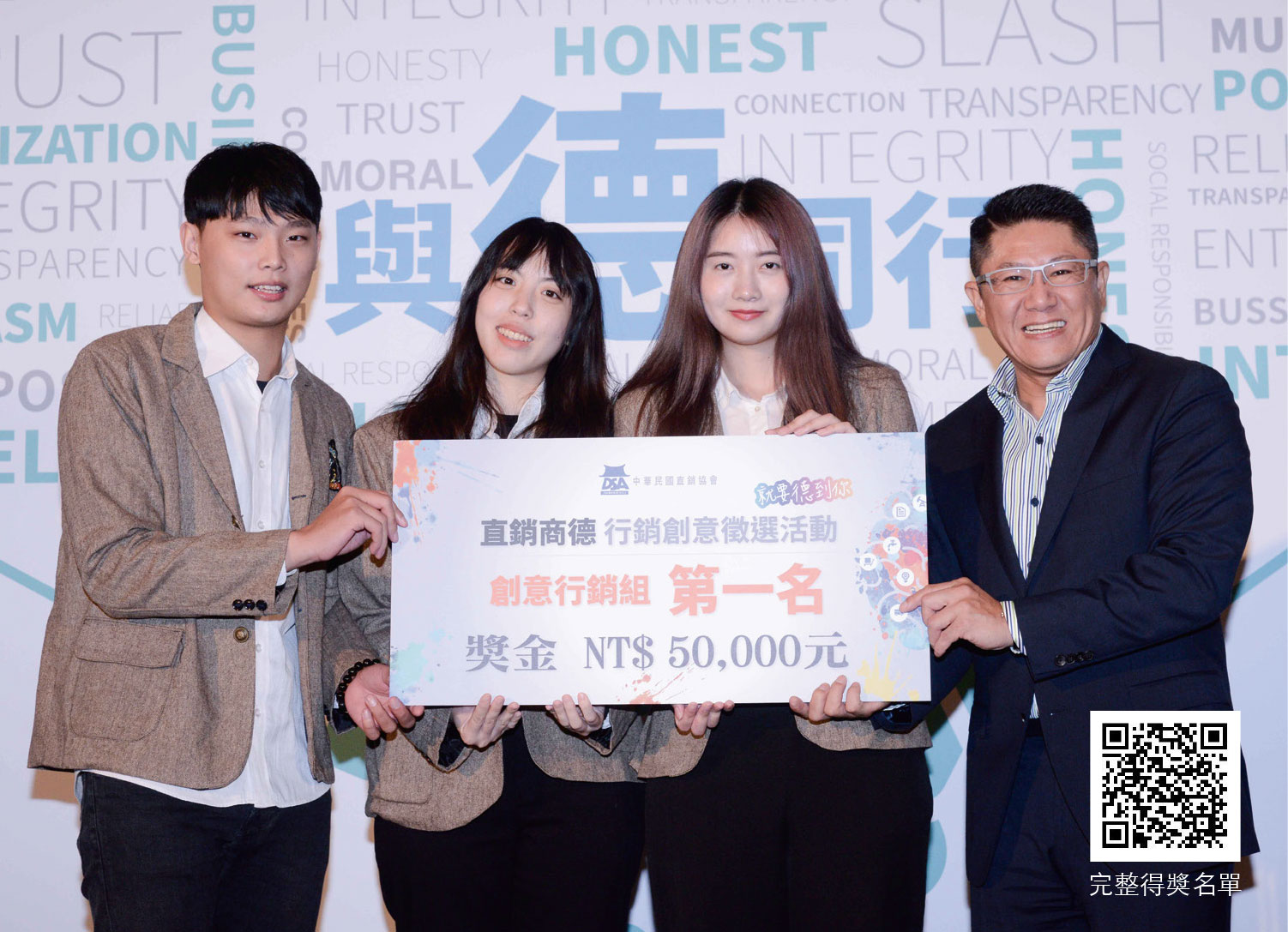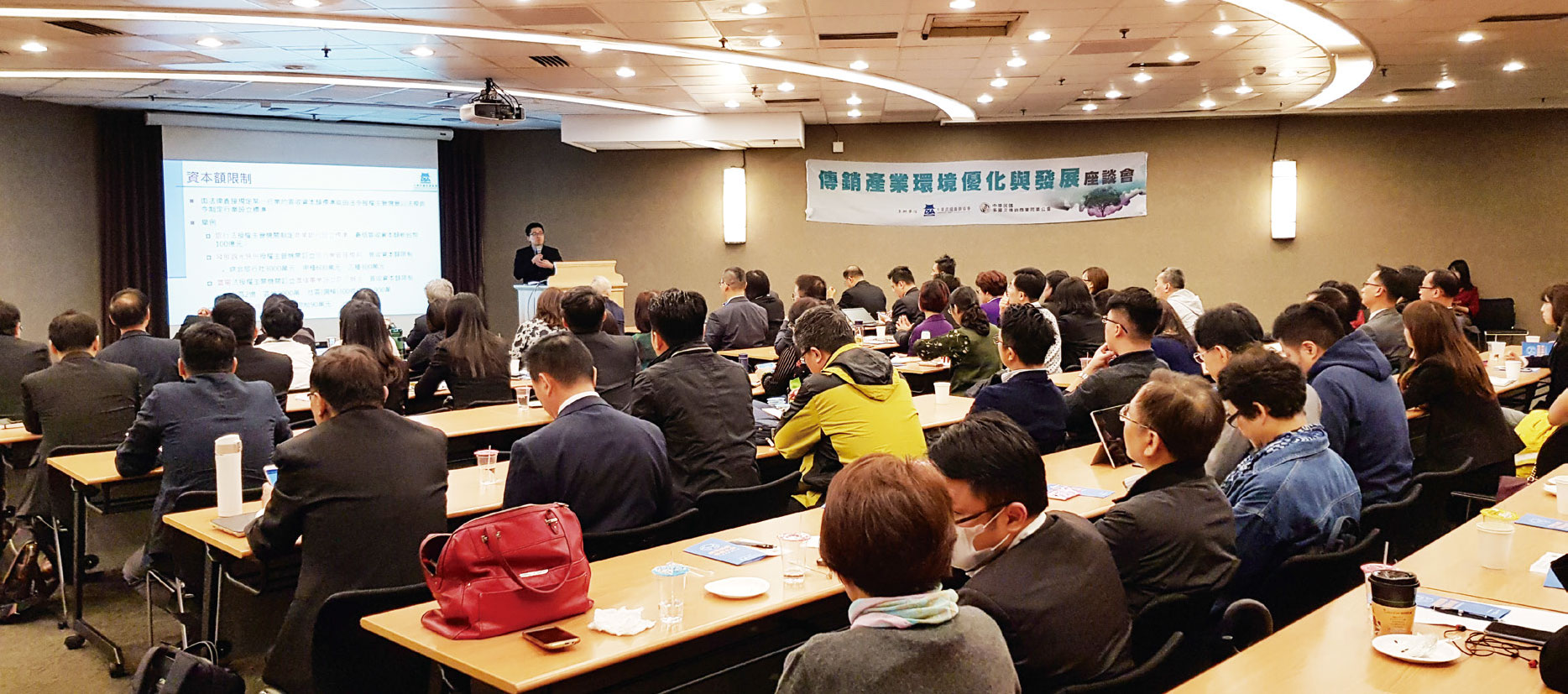

Successful Conclusion of the 2018 Convention of the Direct Selling Association
The Taiwan R.O.C. Direct Selling Association (DSA) conducted its 2018 Convention at Sheraton Grand Taipei Hotel on December 11. Attended by a total of 200 guests of honor and representatives of member companies, this event featured a digital forum, the First General Members' Meeting of the 15th Term and Election of Directors and Supervisors, and a gala dinner.
The Digital Forum, which was organized in collaboration with the Global View Monthly for the second year in a row, invited Tien-chun Hu, Consultant of the Eastern Global New Chain Business; Polo Wu, Head of Digital, JWT China; Chih-hao Chang, CEO of McCann Worldgroup Taiwan; and three experts in e-commerce and social media commerce. They analyzed how the direct selling industry can set up customized digital communities and successfully capture the loyalty of their fans through e-commerce transformation and word of mouth via social media.
In the General Members' Meeting this year, Director Kuang-yu Hu of the Department of Fair Competition of the Fair Trade Commission gave a remark, recognizing the long-term efforts of the DSA in the development of this industry. Chairperson Shirley Chen not only thanked the organizers and co-organizers of various committees once again for their execution of the DSA's business, but also pointed out that for upline or downline alike, good word of mouth and quality services in social media commerce are still a proven law of success for sales growth and are the original objectives of the DSA's long-term promotion of the Code of Ethics. The theme of the General Members' Meeting this year – "Ethical Action" – was a continuation of last year's theme "Ethical Delivery of Promises" to demonstrate our determination and commitment to promoting business ethics. In the meeting, various committees reported their work highlights for 2018 and their work programs for 2019, and the DSA's financial reports and budgets for 2017 through 2019 were adopted, followed shortly by the election of the 15th Term Directors and Supervisors.


Release of the List of Award Winners for the Competition to Solicit Creativity for Direct Selling Business Ethics
The award ceremony for the first Competition to Solicit Creativity for Direct Selling Business Ethics was conducted during the DSA's General Members' Meeting on December 11. This campaign consisted of the Students' Category for Creative Slogans, the Open Category for Creative Slogans and the Creative Marketing Category with six excellent works selected for each category. In particular, the work titled "Sincerity and Credibility Rather Than Cheating; Wealth Creation Through Business Ethics and Self-regulation" authored by Cheng-feng Wu in the Students' Category for Creative Slogans and the work titled "Opportunities Ignited by Direct Selling; and Realization of Dreams Through Business Ethics" authorized by Ying-fang Chang in the Open Category were rated the best out of 126 works.
In addition, Li-yun Huang, Jui-chieh Hsu and Po-hsin Lin, students of the Chinese Culture University, made the "Sharing My Understanding of Business Ethics" series of digital marketing proposals based on the slogan "I Am Ethical, and You Are Comfortable" as the main theme for promoting the self-regulation principle for the direct-selling Code of Ethics and designed a secret chamber escape activity for "Healing Wounds and Chatting about Business Ethics." Since this meets the core spirit of professionalism, protection of consumer rights and interests, and enhancement of the trust relationship between direct selling companies and their distributors and reflects the DSA's original objective to promote upline and downline integration of the industry and promote good word of mouth and services, the judges unanimously recognized this work and provided the Best Award for the Creative Marketing Category and a prize of NT$50,000.
The DSA expects that through competition among young people over marketing slogans and marketing plans, fun and creative elements can be incorporated into the solemn Code of Ethics so that the competitors can better understand the core spirit of the DSA and the Code of Ethics, which can take root in the hearts and minds of the public, making direct selling one of the best business creation options.


Seminar on the Optimized Environment and Development of the Multi-level Marketing Industry and Promotion of Positive Development of the Industry
Following the Evaluation Roadshows for the Code of Ethics of Direct Sellers in July, the Code of Ethics Committee and the Legal Affairs Committee organized the Seminars on the Optimized Environment and Development of the Multi-level Marketing Industry in November in collaboration with the Multi-Level Marketing Protection Foundation. Through three seminars in northern, central and southern Taiwan, the opinions of the operators concerning legal amendments were consolidated in the hope that the development of this industry can be promoted through resource integration of this industry. A total of 260 practitioners and experts from the industry attended the seminars in which the current status of the industry was discussed with an emphasis on the importance of the Code of Ethics.
During the seminars, in-depth discussions were conducted about several issues concerning the industry, including the deposit system in the direct selling industry in various countries and an analysis of the pros and cons of increased entry barriers. In addition, the results of a questionnaire-based survey which had been conducted before the event were also shared in the seminars, marking a great stride forward in mutual exchanges and consensus building in the industry.
As a member of the direct selling industry,the DSA has dedicated itself to the sound development of the industry through in-depth discussions about issues, research of legal provisions, and the promotion of the Code of Ethics since its inception. Therefore, the optimization of the operating environment of the industry is also going to be an area on which the DSA will continuously focus its efforts in the future.


Draft Standards for Determining Food Labeling, Promotions, and Advertisements Involving Exaggerative,False, Misleading or Therapeutic Elements Pre-announced by the MOHW
The Ministry of Health and Welfare (MOHW) pre-announced the formulation of the draft Standards for Determining Food Labeling, Promotions, and Advertisements Involving Exaggerative, False, Misleading or Therapeutic Elements on December 4, 2018 for the second time. The draft will elevate the current administrative rules – Guidelines for Determining Food Labeling, Promotions or Advertisements Involving Exaggerative, False, Misleading or Therapeutic Elements – to the level of regulation and directive mandated by law. The draft was prepared in reference to past circulars and the above administrative rules. Consisting of a total of 16 articles, the draft includes the formulation of the applicable scope of foods and relevant products, methods for determining if the labeling, promotions or advertisements of foods and relevant products are false, exaggerative or misleading, and if such advertisements involve any therapeutic claim. If there is any recommendation concerning the modification of the draft, opinions may be stated to the Taiwan Food and Drug Administration in 60 days upon its public announcement.


MOHW's Announcement of the Draft Partial Amendments to the Act Governing Food Safety and Sanitation
The MOHW announced the draft Partial Amendments to the Act Governing Food Safety and Sanitation on November 22, 2018. In view of the ever advancing food processing technologies, which makes the use of processing aids unavoidable, this draft intends to elevate the definition of a processing aids from the original Standards for the Sanitation of Processing Aids to the level of law under the Act Governing Food Safety and Sanitation, so that the regulated entities will pay more attention to this matter. Consisting of six articles, relevant amendments include: (1) definition of processing aids; (2) mandated provisions concerning the sanitation and safety of processing aids and prohibitions concerning their use; and (3) amendments to provisions concerning audit, control and penalties. If there is any recommendation concerning the modification of the draft, opinions may be stated to the Taiwan Food and Drug Administration in 60 days, upon its public announcement.


Is A Non-Compete Clause Imposed by Direct Selling Companies to Require that the Distributors Shall Not Serve as Distributors ofOther Companies Valid?
There are varying reasons why direct selling companies restrict their distributors from concurrently serving as distributors of other direct selling companies. Some may intend to protect their own trade secrets, while others may seek to ensure that their distributors are loyal and work hard to develop their own organization. There are still others who strive to prevent distributors from using their own organization and connections to sell the prod-ucts of other direct selling companies. The clauses in which a direct selling company stipulates by way of a participation contract or a code of conduct that a distributor shall not concurrently serve as a distributor of two direct selling companies is known as the "non-compete clause."
Pursuant to the 88-Kung-Tsan-Tzu-8801433-001 Circular of 1999 from the Fair Trade Commission, a non-com-pete clause between a direct selling company and a distributor is not essentially illegal due to freedom of con-tract, still the following requirements should be followed:1. The company should perform its duty to inform and enter into a written agreement.2. The effect of violating a non-compete clause should be specifically stipulated, and the effect of such viola-tion shall not be added subsequently by citing general authorization clauses in the agreement to the extent of undermining the rights and interests of a distributor.3. Market competition shall not be affected, and the conditions under which the competition of a distributor will cause substantive damage to a multi-level marketing enterprise shall be considered.
With respect to legal precedents, the 99-Shang-407 Civil Decision rendered by the Taichung Branch of the Taiwan High Court mentioned that if a non-compete clause provides that participants receiving "specific award titles from the company" shall not promote "products not provided by the company or the same products" within the system of the company or the individuals when conducting business promotion during the period of partici-pation, such non-compete clause will be deemed valid.
To wit, a lawful and valid non-compete clause should be limited to distributors receiving "specific award titles," since a typical distributor will not learn about the company's trade secrets and thus there is no need to impose such restriction. In addition, the scope of restriction should be limited to "the scope of the same goods or ser-vices" because there is no need to impose a non-compete clause since there is no competition issue between two companies with different scopes of business.
Therefore, if a direct selling company restricts all distributors from concurrently serving as distributors of anoth-er company without limitation, the validity of such non-compete clause may be questionable.
[Excerpt from the Practical Direct Selling Legal Issues]


